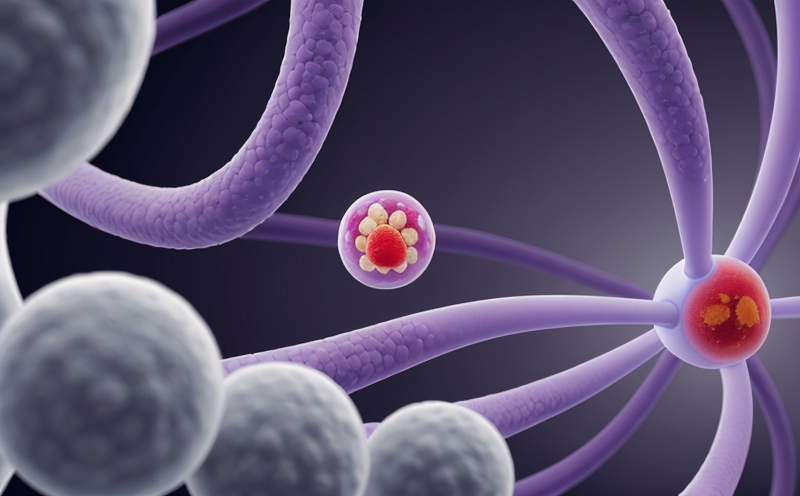Epigenetic Biomarker Testing in Veterinary Oncology
The field of epigenetics has revolutionized our understanding of cancer biology and its role in veterinary oncology. Epigenetic biomarkers, such as DNA methylation, histone modifications, and non-coding RNA expression, play a crucial role in the development, progression, and response to therapy of cancers in animals. By detecting these biomarkers, clinicians can tailor treatment plans more effectively, improving patient outcomes.
Epigenetic changes are alterations in gene function that do not involve a change in the DNA sequence itself but influence how genes are expressed. These modifications include methylation patterns on DNA and histone acetylation/deacetylation. In cancer, these changes can lead to the activation or silencing of certain genes involved in cell division, differentiation, and apoptosis.
In veterinary oncology, epigenetic biomarker testing is increasingly being used as a diagnostic tool to identify cancers early, monitor disease progression, and assess treatment efficacy. This non-invasive method offers several advantages over traditional genetic sequencing approaches:
- It can detect changes in gene expression without altering the DNA sequence.
- The tests are relatively fast and do not require extensive sample preparation.
- Biomarker panels can be tailored to specific cancer types or breeds, enhancing specificity and sensitivity.
At our laboratory, we utilize state-of-the-art instrumentation such as next-generation sequencing (NGS), bisulfite conversion methods for DNA methylation analysis, and mass spectrometry-based techniques for histone modifications. Our team of experienced scientists ensures that all tests are conducted according to international standards like ISO 15189:2017 and EN ISO/IEC 17025:2017.
The process begins with meticulous sample collection, followed by rigorous quality control checks at every step. Once the samples have been processed, they undergo a series of analyses designed to identify specific epigenetic modifications indicative of cancer. Our results are presented in clear, actionable reports that provide insights into the underlying mechanisms driving the disease.
Our expertise in this area has made us leaders in providing accurate and reliable epigenetic biomarker testing services for veterinary oncology. We pride ourselves on delivering high-quality data that supports informed decision-making by veterinarians and researchers alike.
Benefits
The use of epigenetic biomarkers in veterinary oncology offers numerous benefits, including:
- Precision Medicine: Tailored treatments based on individual patient profiles.
- Faster Diagnostics: Reduced time to diagnosis compared to conventional methods.
- Better Prognosis: Improved ability to predict disease progression and response to therapy.
- Cost Efficiency: Reduced costs associated with ineffective treatments through targeted approaches.
These benefits translate into better patient outcomes, reduced suffering, and more efficient use of healthcare resources. By integrating epigenetic biomarker testing into routine practice, veterinarians can achieve a higher standard of care for their patients.
Quality and Reliability Assurance
We take great pride in maintaining the highest standards of quality and reliability assurance in our laboratory practices. Our commitment to excellence is reflected in our adherence to international best practices, including:
- Absorption of ISO 15189:2017 for quality management systems.
- Compliance with EN ISO/IEC 17025:2017 for testing and calibration laboratories.
In addition to these certifications, we employ a robust internal audit process that ensures all procedures are followed correctly. Our state-of-the-art equipment is regularly calibrated by certified technicians, ensuring consistent accuracy across all tests performed. Each test result undergoes multiple quality checks before being released to ensure reliability and accuracy.
We also participate in proficiency testing programs organized by recognized bodies such as the College of American Pathologists (CAP) and the European Federation for Clinical Chemistry and Laboratory Medicine (EFCC). These external validations further strengthen our reputation for delivering accurate, reliable results.
Competitive Advantage and Market Impact
In the rapidly evolving landscape of veterinary oncology, staying ahead requires continuous innovation and commitment to excellence. Our epigenetic biomarker testing service stands out due to several key factors:
- Advanced Technology: Utilization of cutting-edge NGS platforms and mass spectrometry instruments.
- Rigorous Quality Control: Stringent adherence to international standards and regular external audits.
- Expertise: A team of highly trained scientists specializing in epigenetics and veterinary oncology.
The demand for precise, reliable diagnostic tools is growing steadily as the industry recognizes their value in improving patient outcomes. By offering a comprehensive suite of services encompassing both research and clinical applications, we contribute significantly to advancements in this field. Our work not only benefits veterinarians but also supports broader scientific understanding through collaboration with leading universities and research institutions.





